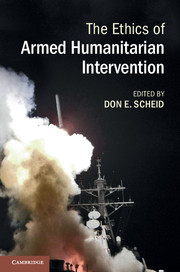Book contents
- Frontmatter
- Contents
- Notes on contributors
- Preface and acknowledgments
- List of abbreviations and acronyms
- Part I Intervention and debate
- Part II Moral perspectives
- Part III Ideas and reconsiderations
- 8 The costs of war
- 9 Armed humanitarian intervention and the problem of abuse after Libya
- 10 The responsibility to protect and the problem of regime change
- 11 Law, ethics, and the responsibility to protect
- 12 Responsibility to protect and the language of crimes
- 13 Post-intervention
- 14 Rethinking responsibility to protect
- Select bibliography
- Index
- References
14 - Rethinking responsibility to protect
The case for human sovereignty
Published online by Cambridge University Press: 05 June 2014
- Frontmatter
- Contents
- Notes on contributors
- Preface and acknowledgments
- List of abbreviations and acronyms
- Part I Intervention and debate
- Part II Moral perspectives
- Part III Ideas and reconsiderations
- 8 The costs of war
- 9 Armed humanitarian intervention and the problem of abuse after Libya
- 10 The responsibility to protect and the problem of regime change
- 11 Law, ethics, and the responsibility to protect
- 12 Responsibility to protect and the language of crimes
- 13 Post-intervention
- 14 Rethinking responsibility to protect
- Select bibliography
- Index
- References
Summary
The rise of universal human rights is transforming the ethics of military action. The breadth and depth of this “rights revolution” is profound, and no aspect of military ethics will be left untouched. Nowhere has the transformative effect of rights been experienced earlier or with more force than in the way we think about military humanitarian intervention. In the last decade the doctrine of Responsibility to Protect has successfully entrenched a conditional understanding of state sovereignty that makes human rights the touchstone of sovereign rights. This has been a genuine advance.
But the current theory and practice of humanitarian intervention is at an unstable resting point in its development. It continues to suffer from significant conceptual and operational deficits. In this chapter I will ask a surprising question: why should we conceive of military humanitarian intervention as a form of war? I will argue that by doing so we deform key aspects of humanitarian intervention, which in turn underlies the significant political controversy that the practice continues to generate. Instead of conceiving of intervention as a form of war, I will suggest we approach it through the paradigm of what I will call “human sovereignty.” This approach affirms the right of people to determine their own political settlements without violent coercive interference from either foreigners or compatriots. It thereby places significant strategic and operational constraints on the conduct of intervention, which I will explore in detail, paying particular attention to the 2011 intervention in Libya. In the final sections, I contrast the human-sovereignty approach with Mill’s classic treatment of intervention and its latter-day reinterpretation by Michael Walzer. Finally, I will reflect on the sources of the obligation to intervene, suggesting that there are reasons why the duty to prevent atrocity is strong even when more lives could perhaps be saved through more traditional forms of aid.
Keywords
- Type
- Chapter
- Information
- The Ethics of Armed Humanitarian Intervention , pp. 243 - 260Publisher: Cambridge University PressPrint publication year: 2014
References
- 3
- Cited by

